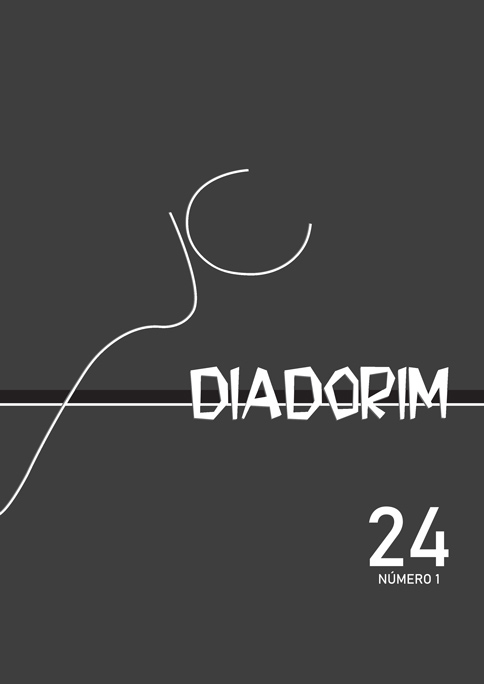AQUISIÇÃO/ENSINO DO PORTUGUÊS EUROPEU POR/A FALANTES ARABÓFONOS EM MARROCOS: ESPECIFICIDADES E ELEMENTOS DE RESPOSTA
DOI:
https://doi.org/10.35520/diadorim.2022.v24n1a48551Keywords:
Aquisição/ensino do português europeu, Língua adicional, Corpus de produções escritas e orais, Materiais para docentes e estudantes, O projeto MAPEAR.Abstract
A primeira Licenciatura em Estudos Portugueses no mundo árabe teve início no ano académico de 2009‑10, em Marrocos, na Universidade Mohammed V de Rabat (UM5R), ao abrigo de um Protocolo de Cooperação entre a UM5R, a Universidade de Lisboa (ULisboa) e o Camões-Instituto da Cooperação e da Língua (Camões I.P.). A Licenciatura tornou-se autónoma, no final do ano letivo 2020‑21, mantendo-se, contudo, a cooperação entre a UM5R e a Faculdade de Letras da Universidade de Lisboa (FLUL), no âmbito das áreas de interesse mútuo, no qual se inclui a língua e a cultura portuguesas/de expressão portuguesa, nas suas variedades. No presente artigo, enquadra-se a Licenciatura do ponto de vista académico e do ponto de vista sociolinguístico – chamando‑se a atenção para o multilinguismo social que caracteriza Marrocos e se espelha na população estudantil, com grande diversidade nas combinatórias de línguas previamente adquiridas e iniciando o estudo do português em idade adulta. Com vista a adequar o ensino do português, na sua variedade nacional europeia e enquanto língua adicional, maioritariamente, a uma população universitária com características linguísticas peculiares, está em curso o Projeto MAPEAR (Construção de materiais de apoio ao ensino e à aquisição tardia de PLE por falantes arabófonos), que se descreve, apresentando-se alguns dados linguísticos ilustrativos dos domínios linguísticos que requerem especial atenção, retirados do corpus de produções escritas e orais já obtidas junto dos estudantes da Licenciatura, acompanhados de uma reflexão sobre o que esses dados nos dizem sobre as interlínguas e nos recomendam, em termos de ação.
The first University Degree in Portuguese Studies in the Arab world began in the academic year of 2009-10, in Morocco, at the Mohammed V University of Rabat (UM5R), under a Cooperation Protocol between the UM5R, the University of Lisbon (ULisboa) and Camões-Institute for Cooperation and Language (Camões IP). Portuguese Studies became autonomous at the end of the 2020-21 academic year. Auspiciously, the cooperation remains between UM5R and the Faculty of Arts of the University of Lisbon (FLUL), throughout a specific protocol on mutual scientific interests, which includes the Portuguese language and culture/the language and culture of Portuguese expression, in its varieties. In this article, the Graduate Degree is framed from an academic point of view, and from a sociolinguistic point of view - drawing attention to the social multilingualism that characterizes Morocco and is mirrored in the student population, with great diversity in the combinations of previously acquired languages and beginning the study of Portuguese in adulthood. In order to adequate the teaching of Portuguese, in its European national variety (mostly, as additional language), to a university population with peculiar linguistic characteristics, the MAPEAR Project (Construction of materials to support teaching and the late acquisition of PLE by Arabic-speakers) will be presented, as well as some linguistic data, taken from the corpus of written and oral productions obtained from the students of the Graduate Degree, accompanied by a reflection on what the data tell us about interlanguages, and about the appropriate actions.
References
ALBET-MAS, Abel; GARCIA-RAMON, M. Dolors; NOGUE-FONT, Joan; RIUDOR-GORGAS, Lluís. Géographie, aménagement du territoire et colonialisme espagnol au Maroc. Cahiers de géographie du Québec, 39(106), p. 43–59, 1995. Disponível em: https://doi.org/10.7202/022477ar. Acesso em: novembro de 2021.
BENNIS, Saïd. La situation linguistique au Maroc : Enjeux et état des lieux, 2011. Disponível em: https://www.academia.edu/7281190/Situation_linguistique_au_Maroc. Acesso em: novembro de 2021.
BOUKOUS, Ahmed. Société, langues et cultures au Maroc : enjeux symboliques. Rabat: Faculté des Lettres et des Sciences Humaines, 1995.
CHEDDADI, Abdesslam. Al-waḍc al-luġawī al-maġribī bayn ’irṯ al-māḍī wa muqtaḍayāt al-ḥāḍer. Al-Madrasa Al-Maghribiya, n. 3, p. 13-41, 2011.
DIESTE, Josep Lluís Mateo; VILLANOVA, José Luis. Les interventores du protectorat espagnol au Maroc. Contextes de production d’une connaissance politique des cabilas. Cahiers d’études africaines, 53 (3), n. 211, p. 595-624, 2013.
ENNAJI, Moha. De la diglossie à la quadriglossie. Langues et linguistiques, revue internationale de linguistique, n. 8, 49-64, 2001.
PINTO, Jorge. Transferências lexicais na aquisição de português como língua terceira ou língua adicional. Um estudo com alunos universitários em Marrocos. Diacrítica, 26/1, p. 171-187, 2012.
______. A aquisição do género e da concordância de género em português língua terceira ou língua adicional. Teorias e Usos Linguísticos. Lisboa: Lidel, p. 91-110, 2017.
NACIRI, Habiba. O multilinguismo e os processos de aquisição de PLE na universidade marroquina. Tese (Doutoramento), Universidade Mohammed V-Agdal, Rabat, 2012.
ROLDÁN ROMERO, Magdalena. El español en el contexto sociolingüístico marroquí: evolución y perspectivas. Aljamía, p. 37-46, 2005.
YOUSSI, Abderrahim. La triglossie dans la typologie linguistique. La linguistique, v. 19, p. 71-83, 1983.
Downloads
Published
Issue
Section
License
Copyright transfer -- Authorization to publication
If the submitted article is approved for publication, it is already agreed that the author authorizes UFRJ to reproduce it and publish it in Diadorim: revista de estudos linguísticos e literários, the terms "reproduction" and "publication" being understood as defined respectively by items VI and I of article 5 of Law 9610/98. The article can be accessed both by the World Wide Web (WWW) and by the printed version, with free consultation and reproduction of a copy of the article for the own use of those who consult. This authorization of publication is not limited in time, and UFRJ is responsible for maintaining the identification of the author of the article.

The journal Diadorim: revista de estudos linguísticos e literários is licensed under a Creative Commons Attribuition-NonCommercial 4.0 International (CC BY-NC 4.0).

